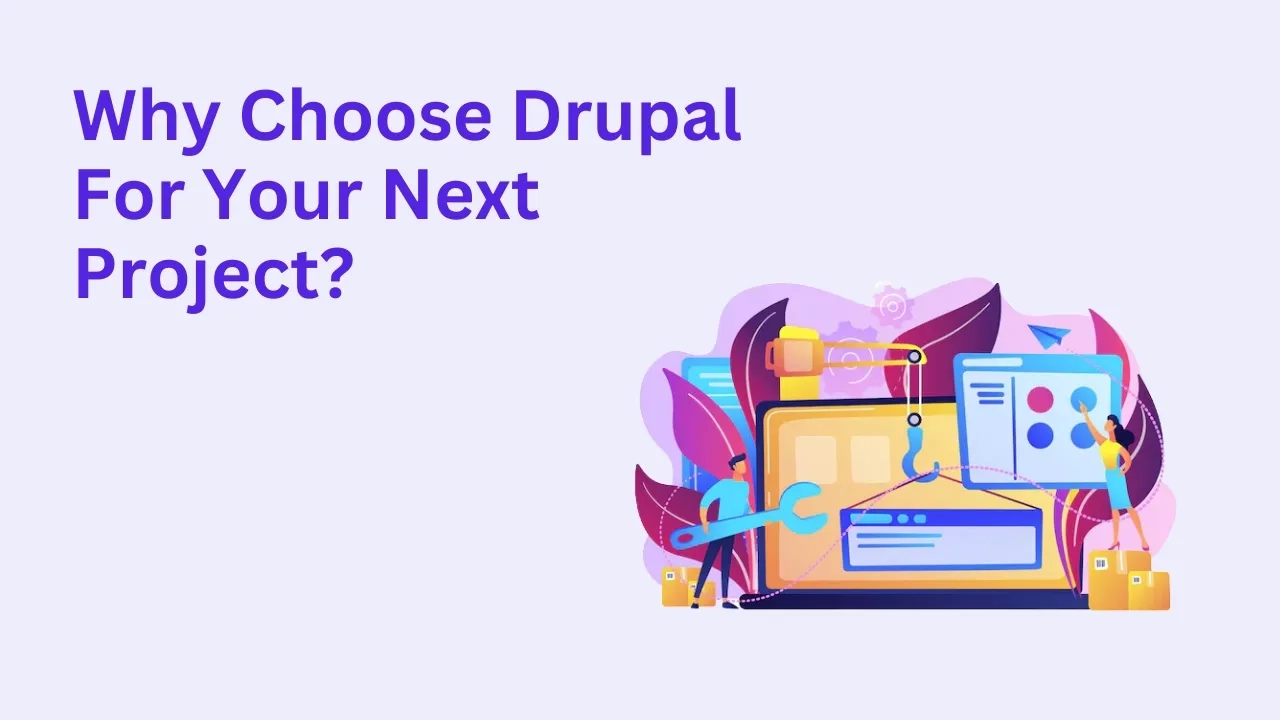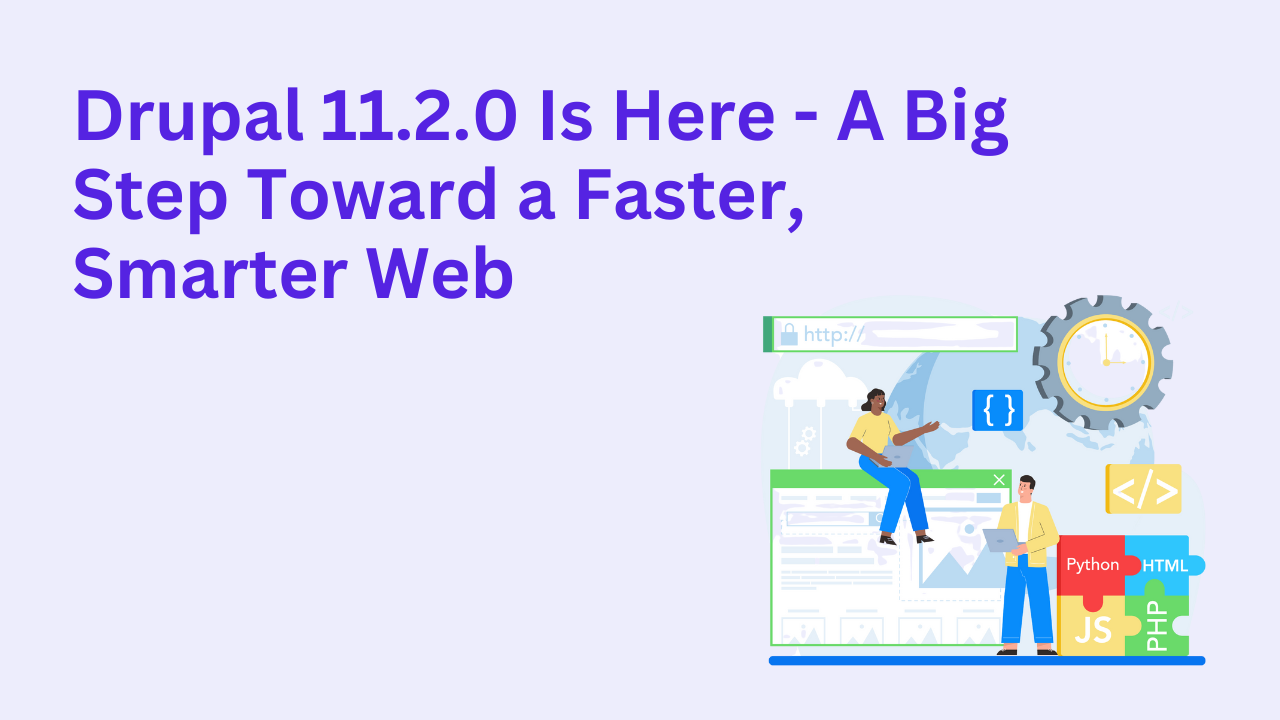Why Choose Drupal for Your Next Project?

Choosing the right content management system (CMS) is critical to the success of your digital project. With countless CMS options available, Drupal stands out as a powerful, flexible, and reliable choice for businesses and organizations of all sizes. In this blog, we’ll explore why you should choose Drupal for your next project and how it can empower your digital strategy.
What Is Drupal?
Drupal is an open-source CMS that allows you to build and manage robust websites, applications, and digital experiences. Known for its flexibility and scalability, Drupal is trusted by governments, enterprises, educational institutions, and non-profits worldwide. Whether you’re creating a simple blog or a complex e-commerce site, Drupal provides the tools you need to succeed.
Key Benefits of Choosing Drupal
1. Unparalleled Flexibility
Drupal’s modular architecture makes it incredibly versatile. With thousands of contributed modules, you can extend Drupal’s functionality to meet your specific requirements. Need advanced SEO tools, multilingual support, or custom content types? Drupal has you covered.
2. Scalability for Growing Projects
One of Drupal’s standout features is its scalability. Whether you’re starting small or managing a high-traffic enterprise website, Drupal can handle it. Its robust caching system and ability to integrate with advanced hosting solutions make it a top choice for scalable projects.
3. Security You Can Trust
When it comes to security, Drupal excels. It is known for its strong community-driven security measures and rigorous testing protocols. Regular updates and patches ensure that your website stays protected from vulnerabilities.
4. Customizable Design and Themes
Drupal’s theming system lets you create visually stunning websites that align with your brand. With responsive design capabilities, your website will look great on any device, ensuring a seamless user experience.
5. Multilingual Capabilities
Expanding globally? Drupal’s built-in multilingual support makes it easy to create websites that cater to diverse audiences. With over 100 languages supported, you can deliver personalized experiences to users worldwide.
Who Can Benefit from Drupal?
1. Enterprises
Large organizations often require robust, scalable platforms that can integrate with various tools and systems. Drupal’s flexibility and security make it a preferred choice for enterprise-level projects.
2. Educational Institutions
Drupal’s modular design is perfect for universities and schools looking to manage content-rich websites, student portals, or learning platforms.
3. E-Commerce Businesses
With powerful integrations like Drupal Commerce, businesses can build feature-rich online stores tailored to their unique needs.
4. Non-Profits and Government Agencies
Drupal’s accessibility features and strong security measures make it a great fit for non-profits and government organizations focused on transparency and inclusivity.
Drupal vs. Other CMS Platforms
Here’s how Drupal stacks up against other popular CMS options:
| Feature | Drupal | WordPress | Joomla |
|---|---|---|---|
| Flexibility | High | Moderate | Moderate |
| Security | Excellent | Moderate | Moderate |
| Scalability | High | Moderate | Moderate |
| Multilingual Support | Built-in | Requires Plugins | Built-in |
Drupal stands out for projects requiring high customization, scalability, and security.
Common Misconceptions About Drupal
1. Is Drupal Only for Developers?
While Drupal offers advanced features for developers, its intuitive admin interface makes it accessible to non-technical users too. Training resources and community support are always available.
2. Is Drupal Expensive?
Drupal is open-source, meaning there’s no licensing fee. While professional development services may involve costs, the platform’s long-term benefits often outweigh the initial investment.
3. Is Drupal Outdated?
Far from it! With its continuous updates and a thriving community, Drupal remains at the forefront of CMS innovation.
Real-World Examples of Drupal Success
- NASA uses Drupal to power its public website, ensuring scalability and accessibility for millions of visitors.
- The Economist relies on Drupal for its content-rich platform, delivering news to readers worldwide.
- University of Oxford leverages Drupal for its academic and administrative websites, highlighting its capability in the education sector.
How to Get Started with Drupal
Embarking on a Drupal project is easier than you think. Here’s a simple roadmap:
- Define Your Goals: Determine the purpose and requirements of your website.
- Hire an Expert Team: Partner with experienced Drupal developers to ensure a smooth development process.
- Choose Hosting: Select a reliable hosting provider optimized for Drupal.
- Develop and Launch: Work closely with your team to build, test, and launch your website.
- Continuous Optimization: Regularly update and optimize your site to stay ahead.
Conclusion
Choosing Drupal for your next project ensures you’re investing in a powerful, secure, and future-proof platform. Its flexibility, scalability, and strong community support make it the ideal CMS for businesses, non-profits, and enterprises looking to create impactful digital experiences.
Ready to start your Drupal journey? Contact Drupalify today to explore how Drupal can elevate your next project!








